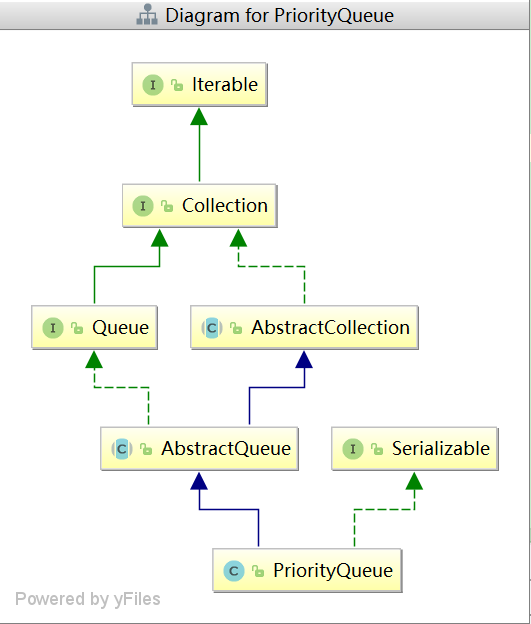队列概述
1.基于优先堆得无界队列(初始默认长度11,最大长度Integer.MAX_VALUE - 8;),容量会自动增长。
2.根据自然顺序、队列构造时提供的Comparator排序。
3.不允许插入null、不可比较元素,线程不安全。(PriorityBlockingQueue线程安全)
4.最小元素存放在队头。(如果并列最小,则随机存放)。
5.队列检索操作poll , remove , peek和element访问队列开头的元素
6.时间复杂度分析
入队和出队方法( offer , poll , remove()和add )提供O(log(n))时间; remove(Object)contains(Object)方法的线性时间;
固定时间的检索方法( peek , element和size )
一、队列基本信息
1.队列继承关系图
2.重要属性
/***指定队列默认长度(初始化,不指定队列长度时,采用此值)*/private static final int DEFAULT_INITIAL_CAPACITY = 11;/***底层存储元素数组。transient标记数组不会被序列化*/transient Object[] queue; // non-private to simplify nested class access/*** The number of elements in the priority queue.* 记录队列中元素数量*/private int size = 0;/*** The comparator, or null if priority queue uses elements' natural ordering.* 如果为null,则使用自然排序。(初始化时,可以指定比较器)*/private final Comparator<? super E> comparator;/*** The number of times this priority queue has been* <i>structurally modified</i>. See AbstractList for gory details.* 记录数据中元素操作次数*/transient int modCount = 0; // non-private to simplify nested class access/*** The maximum size of array to allocate.* Some VMs reserve some header words in an array.* Attempts to allocate larger arrays may result in* OutOfMemoryError: Requested array size exceeds VM limit* 指定队列存储的最大元素个数*/private static final int MAX_ARRAY_SIZE = Integer.MAX_VALUE - 8;
二、源码分析
/*** 可指定比较器的构成函数*/public PriorityQueue(int initialCapacity,Comparator<? super E> comparator) {// Note: This restriction of at least one is not actually needed,// but continues for 1.5 compatibilityif (initialCapacity < 1)throw new IllegalArgumentException();this.queue = new Object[initialCapacity];this.comparator = comparator;}/***通过传递集合入参,初始化队列* 1.入参为SortedSet* 2.入参为队列* 3.入参为其他集合类型*/public PriorityQueue(Collection<? extends E> c) {if (c instanceof SortedSet<?>) {SortedSet<? extends E> ss = (SortedSet<? extends E>) c;this.comparator = (Comparator<? super E>) ss.comparator();initElementsFromCollection(ss);}else if (c instanceof PriorityQueue<?>) {PriorityQueue<? extends E> pq = (PriorityQueue<? extends E>) c;this.comparator = (Comparator<? super E>) pq.comparator();initFromPriorityQueue(pq);}else {this.comparator = null;initFromCollection(c);}}/*** 通过【有序集合】进行队列元素初始化* 1.将集合处理为Object[]类型* 2.校验集合中是否存在null元素,如果存在则报错* 3.将1中数组赋值队列中数据对象*/private void initElementsFromCollection(Collection<? extends E> c) {Object[] a = c.toArray();// If c.toArray incorrectly doesn't return Object[], copy it.if (a.getClass() != Object[].class)a = Arrays.copyOf(a, a.length, Object[].class);int len = a.length;if (len == 1 || this.comparator != null)for (int i = 0; i < len; i++)//队列中不允许存储null值if (a[i] == null)throw new NullPointerException();this.queue = a;this.size = a.length;}/*** Initializes queue array with elements from the given Collection.* 1.初始化底层数组* 2.对数组进行排序* @param c the collection*/private void initFromCollection(Collection<? extends E> c) {initElementsFromCollection(c);heapify();}private void heapify() {for (int i = (size >>> 1) - 1; i >= 0; i--)siftDown(i, (E) queue[i]);}private void siftDown(int k, E x) {if (comparator != null)siftDownUsingComparator(k, x);elsesiftDownComparable(k, x);}/***排序,利用数组实现二叉堆排序(可参考PriorityBlockingQueue队列)*/private void siftDownComparable(int k, E x) {Comparable<? super E> key = (Comparable<? super E>)x;int half = size >>> 1; // loop while a non-leafwhile (k < half) {int child = (k << 1) + 1; // assume left child is leastObject c = queue[child];int right = child + 1;if (right < size &&((Comparable<? super E>) c).compareTo((E) queue[right]) > 0)c = queue[child = right];if (key.compareTo((E) c) <= 0)break;queue[k] = c;k = child;}queue[k] = key;}


